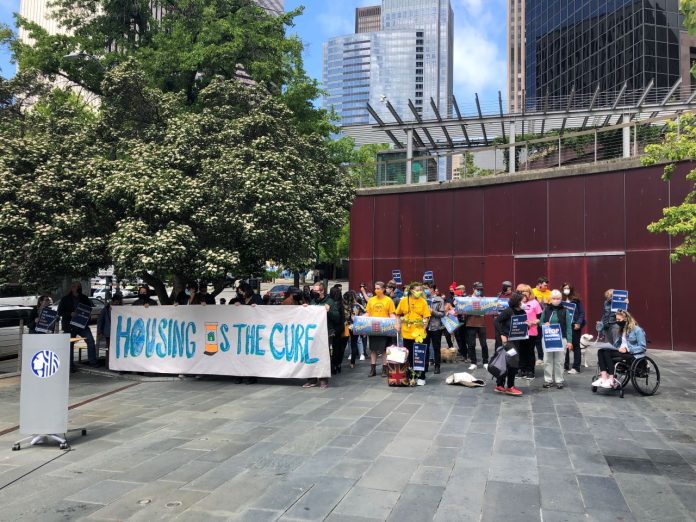
To prevent homelessness and improve housing stability, don’t cut funding for tenant services and rental assistance – double it.
Mayor Bruce Harrell’s proposed 2025-2026 budget would slash funding for tenant services and rental assistance in half, putting thousands of Seattle renters at risk of instability, displacement, eviction, and homelessness.
The proposed budget cuts rental assistance funds from about $1 million to only $527,000, and funds for tenant counseling, education, casework, and legal services from about $2.5 million to only $1.2 million. These proposed cuts are coming at a time when both evictions and homelessness are at record levels.
The most cost-effective way to address homelessness is to prevent it, by helping people to stay housed. This is what rental assistance and tenant services do. A tenant at risk of eviction can often resolve a conflict with their landlord with the help of a tenant counselor. A family facing unhealthy living conditions such as mold, lack of heat, or neglected repairs can get advice about standing up for their rights. People exiting transitional housing can find assistance applying for a rental home and learn about their rights and obligations, preparing them to be good tenants.
Cuts to these services will put vulnerable tenants at risk. Without rental assistance and legal aid, more people will be evicted by default in the back rooms of Zoom court proceedings. You won’t know about them until you see them sleeping on the street.
City-funded tenant services are currently provided through ten community-based organizations, including: Tenants Union of Washington State, Solid Ground, Catholic Community Services’ Tenant Law Center, Queer Power Alliance, Somali Community Services of Seattle, Villa Comunitaria, InterIm Community Development Association, Be:Seattle, United Indians of All Tribes Foundation, and the King County Bar Association’s Housing Justice Project.
The undersigned organizations offer the following comments and respectfully recommend that in order to better ensure stability for Seattle’s residents, the City Council should amend the Mayor’s proposed budget to double tenant services to $5 million per year, and increase rental assistance funds to at least $2 million per year.
Sarah White, Operations Manager at the Tenant Law Center (TLC): “The homelessness crisis is the top issue for Seattle voters. The easiest way to fight homelessness is to keep people from being evicted for simple issues that can be handled outside of court. $400 worth of lawyer time now can prevent thousands of dollars in services required when a family is evicted. Evicted families lose jobs, education and have dismal health outcomes. Preventing court filings for the most vulnerable is what TLC does. We also work closely with the Seattle Housing Authority to make sure that people do not lose their subsidies for things like not filling in their annual recertification papers. A housing choice voucher is a ticket to long-term, stable housing and is the most valuable asset a family may have. They can lose it so easily without the help of an attorney to advocate for them.”
Kate Rubin, Organizing Director at Be:Seattle: “Be:Seattle serves around 785 renters annually, but the impact of our renter education and organizing is exponential. Renters typically come to us frustrated by unresolved issues. We equip them with knowledge of their rights, guide them in navigating landlord-tenant relationships, and teach strategic organizing skills. This knowledge spreads through their communities, often reaching those who might not otherwise have access. Without funding for this work, disputes would escalate and more people would be at risk of displacement and homelessness.”
Edmund Witter, Senior Managing Attorney at the King County Bar Association’s Housing Justice Project: “The proposed budget looks poised to cut right to counsel funding by roughly half at a time when evictions are hitting record levels. This will likely mean we cannot serve hundreds of tenants in Seattle next year.”
Shalimar Gonzales, Chief Executive Officer at Solid Ground: “In 2023, over 1,700 people across the Seattle/King County region accessed our community workshops and our bilingual Tenant Voice Message Line. Our Tenant Counselors work 1-1 with tenants and provide an opportunity to brainstorm and problem solve. They share the most updated information about their rights and responsibilities under the state RLTA and municipal codes, refer them to legal resources, and connect them to other community resources and rental assistance. We also help people prepare for tenant screenings, request payment plans for move-in, and support people with understanding their lease agreements and applications.”
Stephanie Zhang, Equitable Development Community Organizer at InterIm Community Development Association: “InterIm Community Development Association Works closely with a population in the Chinatown-International district that has limited access to housing resources, especially information about their rights as tenants. This year we’ve been able to use the tenant services funding to provide information to 482 community members. Our efforts to assist a vulnerable population, the majority of whom are non-English speaking elders and low-income workers, fills a necessary gap that Mayor Harrell’s budget proposal threatens to widen.”
Terri Anderson, Interim Executive Director of the Tenants Union of Washington State: “The Tenants Union of Washington State is crucial in empowering renters with the knowledge they need to navigate housing challenges. We served over 2,000 Seattle renters in the last year. Our services not only provide essential information but also foster a sense of community, ensuring that every tenant understands their rights and can advocate for themselves. This keeps families and individuals housed and communities intact.”
Alison Eisinger, Executive Director of the Seattle/King County Coalition on Homelessness: “Seattle residents deserve increased city investments in services and programs that help people maintain stable homes. Rather than slash the city’s modest pool of resources, the City Council and Mayor Harrell should invest MORE to keep people housed and address situations that may lead to homelessness.”
Seattle needs more skilled and experienced community-based staff to help prevent households from becoming homeless, to help tenants and landlords address and resolve issues before any legal filings are necessary, and to help people pay back rent when necessary. The City’s support for these services, even doubled, is extremely modest compared to the needs among our neighbors. We urge you to make this investment in housing stability and homelessness prevention without delay.
SIGNED:
- 350 Seattle
- Be:Seattle
- Catholic Community Services of Western Washington
- House Our Neighbors
- Housing Justice Project
- InterIm Community Development Association
- Lake City Taskforce on Homelessness
- Lived Experience Coalition
- Nickelsville
- North Helpline
- Queer Power Alliance
- Real Change
- Seattle/King County Coalition on Homelessness
- SHARE (Seattle Housing and Resource Effort)
- Solid Ground
- Tech 4 Housing
- Tenant Law Center
- Tenants Union of Washington State
- Transit Riders Union
- Washington Physicians for Social Responsibility
- WHEEL (Women’s Housing, Equality and Enhancement League)
This op-ed was written as an open letter to the Seattle City Council.
Editor’s note: The Urbanist advocacy committee was an original coalition member in 2021, but The Urbanist did not sign this current letter. Our publication team does not participate in coalitions.
The Stay Housed Stay Healthy Coalition is an alliance of organizations fighting for stronger renter protections in Seattle, King County and Washington State. It was founded in early 2021.

